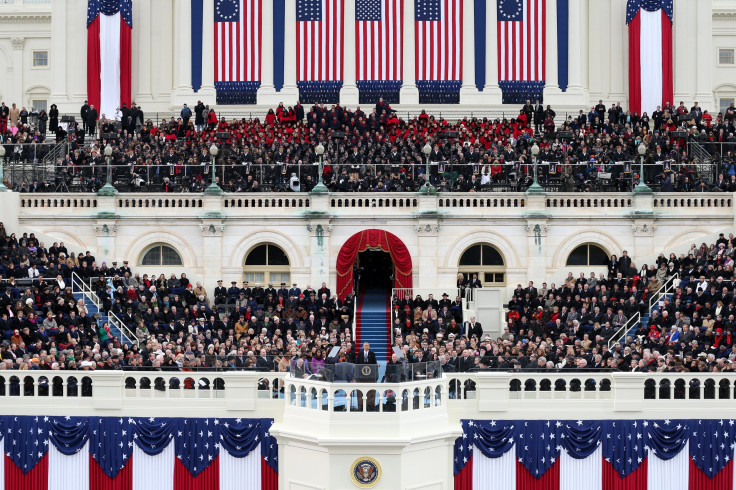Dakota Access Pipeline Latest Update: Standing Rock Protesters Disrupt Trump's Inauguration

WASHINGTON -- Dozens of protesters slowly walked backward without looking, their eyes trained on the approaching police officers. Their hands clasped together inside tissue-paper-wrapped PVC pipes, the activists sang in unison, chanting "water heals our body, water heals our soul" until their backs hit the metal security gates near 14th and E Streets in Washington, D.C.
A passing Donald Trump fan muttered "get a job."
As the rain began to come down, the activists remained resolute with their arms linked. They didn't abandon their post -- not even when the sounds of a motorized saw filled the air as police forcibly dismantled their blockade. They were determined not only to disrupt Trump's inauguration but also to protect the tribal grounds and water supply at the Standing Rock Sioux Reservation in North Dakota from the Dakota Access Pipeline.
"We are still here, and they are still drilling," they shouted as reporters and officers swarmed around them.
Protesters w/ #DisruptJ20 are blocking the security checkpoint near 14th and F for #noDAPL. pic.twitter.com/CFs09THTTa
— Julia Glum (@SuperJulia) January 20, 2017
Activists from Standing Rock and all over the world were in the nation's capital with DisruptJ20, also known as the D.C. Counter-Inaugural Welcoming Committee. The group had vowed to make Inauguration Day a "clusterf---" in order to delegitimize Trump's presidency, and the climate justice protest was part of that. They were focused on the Dakota Access Pipeline, which is being constructed underground to transport crude oil to Illinois.
Maybell Eequay Reiter, 22, flew in Thursday from Standing Rock, where she's been living in a Mongolian yurt since October. The daughter of a white woman and Anishinaabe man, Reiter said she was attending the inauguration in part to redirect people's attention to the $3.8 billion pipeline protesters argue could contaminate the tribe's water source and disturb sacred grounds.
Stuffing her hands in the pockets of her moose-hide-lined coat as the protest wound down, Reiter said action was necessary because she didn't want the pipeline battle to be forgotten. It once dominated the headlines but has since largely faded from public discourse, she said, like the water crisis in Flint, Michigan.
Just streets away from the White House, Reiter described the stakes in no uncertain terms.
"All land was Native American land at one point," Reiter said. "These pipelines are raping Mother Earth. The oil company does not have the consent of the people whose land they're putting it through."
Police not happy w/ #NoDAPL #DisruptJ20 blockade. (shaky) VIDEO: pic.twitter.com/tkPhWyGyeK
— Julia Glum (@SuperJulia) January 20, 2017
At times during Friday's protest, activists were running, leaping over metal barricades to clump together and face off against police officers. They yelled when authorities began to move them, crying "you're hurting us" even as they were pushed away from the checkpoint they were trying to close down. People thrust their iPhones into the air, narrating the scenes in front of them as they live-streamed their resistance.
Reiter, who was wearing a medicine pouch embroidered with colored porcupine quills, was alternating between watching and participating in the protest. She said she hoped the Inauguration Day events, from DisruptJ20 and more, would inspire people to head to the reservation so the pipeline issue stays in the forefront of Americans' minds.
"People think that it's over, and it's not," she said. "We are putting the call out ... We need brave, peaceful people who care about the future generations, our Earth and clean water."
Crowd is thinning, but the #noDAPL #disruptj20 protesters are still using their bodies to block security. Now lying on ground. pic.twitter.com/FlRSC342NF
— Julia Glum (@SuperJulia) January 20, 2017
© Copyright IBTimes 2024. All rights reserved.





















